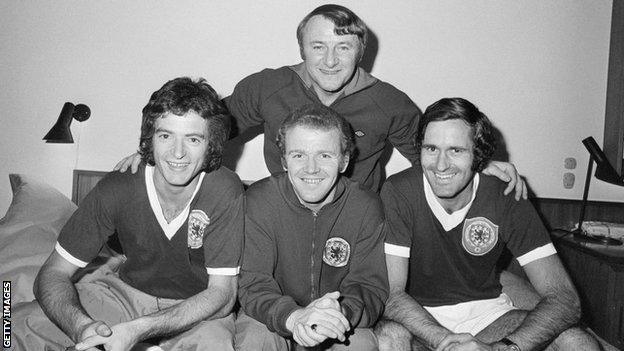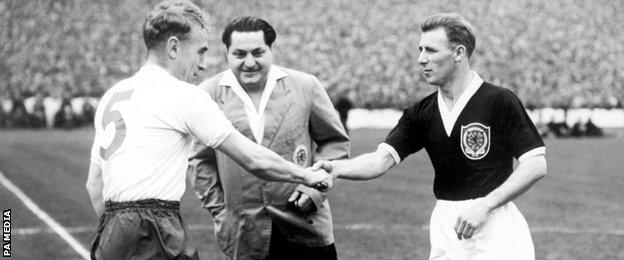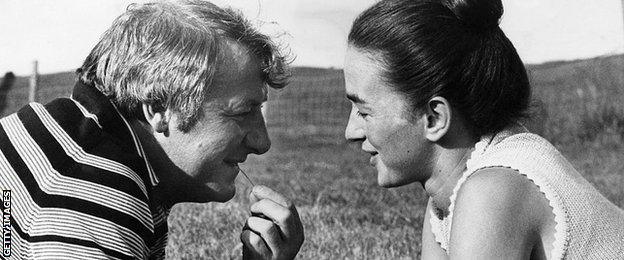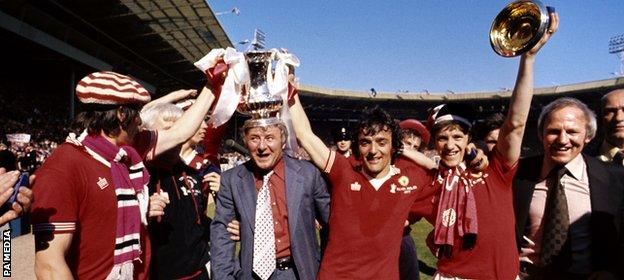Tommy Docherty - manager of many clubs, quips, anecdotes and one-liners
- Published

Tommy Docherty (back) said his biggest regret was leaving Scotland for Manchester United
Tommy Docherty, who has died at the age of 92, will be remembered as one of football's great characters.
Known as "The Doc", he managed 12 clubs and the Scotland national team during the most colourful of careers.
He was irrepressible, outspoken and often controversial, accruing a seemingly endless supply of anecdotes, quips and one-liners.
Docherty spent nine years as a player with Preston North End and played for Scotland at the 1958 World Cup in Sweden before a managerial career that took him to Portugal and Australia. However, he is probably best remembered for a five-year spell with Manchester United.
Born in the Gorbals district of Glasgow on 24 April 1928, he once said in a Daily Telegraph interview of his tough upbringing: "If you wanted a new pair of shoes, you went down the swimming baths in bare feet and just nicked a pair. I didn't think it was morally wrong. It was the thing to do."
His mother, Georgina, was a charwoman, but he recalled nothing of his father, Thomas, who worked in an iron foundry.
"I don't remember him putting me on his knee, or telling me a story, or taking me to a park," Docherty said. "I only remember the sound of my mum crying when there was a loud knock on the door to tell her he was dying.
"He was in hospital with pleurisy. They'd give you a couple of tablets for that now."
Leaving Celtic one of biggest disappointments

Tommy Docherty (right) captained Scotland in his playing days
Docherty started his career as a right-half at junior side Shettleston before joining boyhood heroes Celtic in 1947 after leaving the army, making his debut in a 1-0 home league defeat by Rangers.
He left for Preston in 1949 - the year in which he married his first wife, Agnes - after failing to pin down a first-team spot and said years later: "When I was a youngster, it was my one and only ambition to play in a green and white jersey. When I was transferred, it was one of the great disappointments of my life."
His time at Deepdale included an appearance in the 1954 FA Cup final and he won the first of his 25 Scotland caps, playing twice in the 1954 World Cup finals.
In 1958, Docherty joined Arsenal, where he effectively ended his playing career.
Although he made a few appearances for Chelsea after moving to Stamford Bridge in February 1961, the switch brought about his first step into coaching and management.
He was unable to prevent the west London club being relegated from the top flight at the end of the 1961-62 season, but the Blues bounced back at the first attempt.
In 1964-65, they won the League Cup with an aggregate victory over Leicester City but lost the 1967 FA Cup final to Tottenham Hotspur.
Docherty left to become manager of unfashionable Rotherham United and memorably said: "I promised I would take Rotherham out of the Second Division - and I took them into the Third. The old chairman said, 'Doc, you're a man of your word!"'
The Glaswegian left Rotherham after a year and began racking up a dizzying number of clubs while honing his repartee.
He had spells at Queens Park Rangers, Aston Villa and Porto and a term as assistant manager to Terry Neill at Hull City before leaving in 1971 to become manager of Scotland, first on a temporary basis, then permanently.
In December 1972, with Scotland having qualified for the 1974 World Cup finals in West Germany, he quit to take over at Manchester United.
"One of my biggest regrets was leaving the Scotland job when I did," he later said.
One love lost, another gained

Tommy Docherty's affair with future wife Mary Brown led to his sacking at Old Trafford
The Red Devils were relegated to the Second Division in 1974 but stormed back the next season as champions.
After United surprisingly lost the 1976 FA Cup final 1-0 to Second Division outfit Southampton, Docherty led his side to the FA Cup final again the following year, when they beat favourites Liverpool 2-1.
However, celebrations did not last as he was almost immediately sacked for having an affair with the wife of club physiotherapist Laurie Brown. Docherty later married Mary Brown and they remained together until his death.
They had two children, Lucy and Grace, while he had four children - Tom, Michael, Peter and Catherine - with Agnes, who died in 2002.
Docherty returned to management with Derby County before moving back to QPR, where was sacked, then reinstated after just nine days - and then sacked again.
He subsequently had spells at Sydney Olympic, Preston, South Melbourne and then managed Sydney again in 1983 before becoming boss of Wolverhampton Wanderers. Altrincham was his final managerial post before retirement at the end of the 1987-88 campaign.
Docherty later worked as an after-dinner speaker and media pundit and was inducted into the Scottish Football Hall of Fame in November.
He was still going strong with the jokes at the media conference but for once turned serious, saying: "This is something that will be there forever and will never be obliterated."
'The Doc was a law until himself'

Tommy Docherty and Lou Macari (centre) lifted the FA Cup with Manchester United
Former Scotland and Man Utd striker Lou Macari on BBC Radio Scotland's Drivetime
There was no bigger character in the game than the Doc and there has never been one of such character since.
He was funny, he could argue with you, but if you had a raging argument with him, he would make up with you the next day - it didn't affect your position in the team.
As far as company is concerned, I couldn't have had better company over the years than Tommy Doc and, believe it or not, it was one of the biggest assets to his management style. The laughter and wit in the dressing-room before any game made every player relaxed.
He had these wild dreams. When we got relegated, he told everybody in Manchester we would be back the next year - it happened and it's never easy to do that.
We went to an FA Cup final at Wembley and we were expected to win against Southampton and we didn't - conceded a goal six minutes from the end. Got back into the dressing-room, we were down, but he lifted us by telling us we would be back next year and next year we won it, beating Liverpool.
I had Jock Stein who changed my life by taking me to Celtic as a young boy and then I went to Old Trafford with the Doc. He was an entertainer, a law unto himself and a great guy.